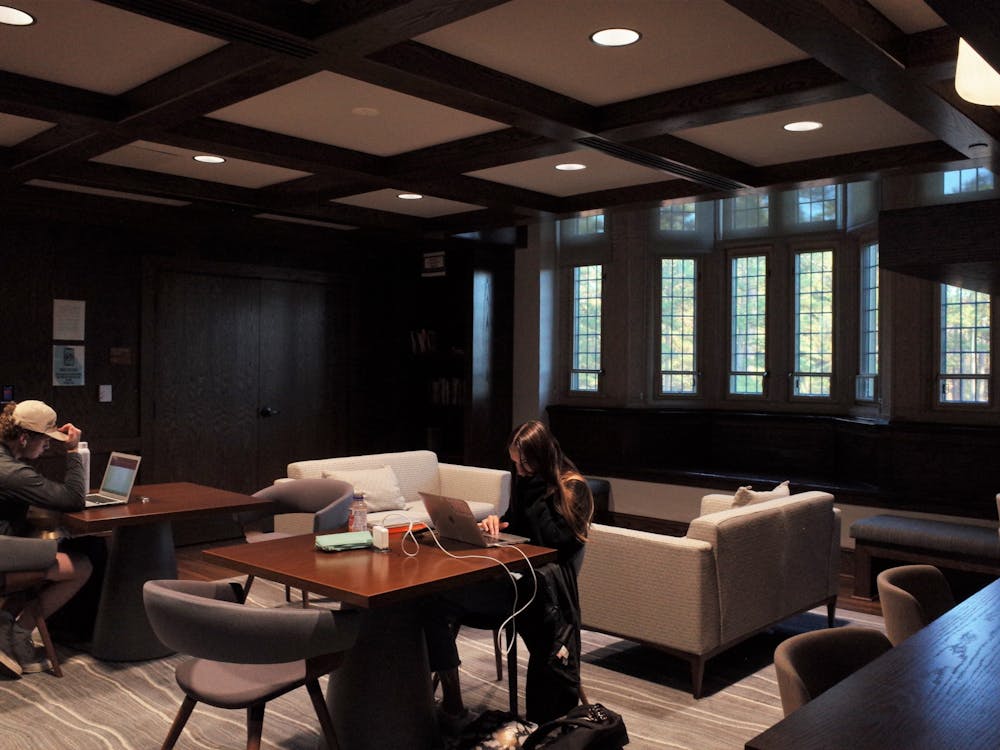Only 35 colleges nationally don't pay attention to an applicant's financial status during the admissions process and also meet 100 percent of so-called "demonstrated financial need" as determined by the Free Application for Federal Student Aid and university policies.
The University of Richmond is one of those schools, a message admissions officials touted this morning in Brunet Memorial Hall during a special statewide financial aid seminar called WRAP.
WRAP sessions -- which stand for "Within Reach and Personal" -- were held across Virginia today to discuss financial aid and the affordability of private colleges and universities in response to the worsening economic climate, admission counselor Tom Nicholas said. About 40 parents and students attended.
The sessions were organized by the Council of Independent Colleges of Virginia, which encompasses most private colleges in Virginia, he said.
Nicholas described the admission process at the Richmond before Michelle Bhatta, assistant director of financial aid, discussed how the financial aid process works.
Financial aid is broken down into two categories: need-based and merit-based. Richmond is "need-blind" during admissions.
The Office of Admission and the Office of Financial Aid work separately and blend only at the end of the process, Bhatta said. A student is admitted to the university based on his or her merits and is not discriminated against because of financial need, she said.
A sealed financial aid packet goes inside an acceptance packet, meaning the the two offices never discuss the student together, Bhatta said.
To apply for need-based financial aid, parents must fill out the Free Application for Federal Student Aid (FAFSA). Need-based financial aid is determined by subtracting the expected family contribution toward tuition from the cost of attendance at the university.
It currently costs $49,190, including room and board fees, to attend Richmond. The expected family contribution is calculated by a federal need analysis formula and institutional financial aid policies.
The university takes into account parents' finances, assets, contributions to a retirement plan, the number of members in the family and the number of children in college as well as students' finances when calculating how much a family can contribute, Bhatta said.
The final amount of financial aid awarded to the student is then broken up into grants and a self-help loan that is capped at $4,000. For example, if a student was awarded $47,190 in financial aid, the student would receive $43,190 in grants, which do not have to be repaid, and $4,000 in self-help loans.
Enjoy what you're reading?
Signup for our newsletter
If a student receives additional scholarships from an organization outside of the university, the money replaces up to $4,000 of the self-help loan, Bhatta said. Any scholarships exceeding $4,000 will be replaced by some of the grant money awarded, she said.
Richmond also offers merit scholarships. If students apply to Richmond by Dec. 15, they are automatically considered for merit-based scholarships, Bhatta said.
While there are many specific scholarships for the arts -- including National Merit Scholarships -- officials select 50 students each year to be Richmond scholars, who receive full tuition at Richmond for eight semesters, she said.
Final candidates who illustrate exemplary academic achievement and have something exceptional to offer the campus will have an all-expense paid trip to Richmond to interview for one of the 50 spots, Nicholas said.
Richmond also offers special financial aid opportunities for Virginia residents, who can apply for the $3,200-per-year Virginia tuition assistance grant, Bhatta said.
Richmond also offers full tuition, room and board to first-year Virginia students admitted to the university, but whose family income is less than $40,000.
Kim Price, a Gloucester, Va., native, didn't think her family could afford to send her daughter, Erica, to Richmond until coming to the WRAP session.
"I mean it could possibly be less expensive to come here than go to a state school," Price said.
Despite the waning worldwide economy, Richmond has not had to cut back on financial aid awards.
"We've been very lucky in this situation compared to many colleges," Nicholas said. "The endowment is doing very well. Our financial aid remains exactly the same and we're very excited about it."
The WRAP session is a one-time event at the moment, Nicholas said, but Richmond holds affordability sessions regularly. Richmond owns a distinct financial aid system nationally, officials said.
Said Nicholas: "It's rare to truly do what we do."
Contact reporter Ryan Clark at ryan.clark@richmond.edu
Support independent student media
You can make a tax-deductible donation by clicking the button below, which takes you to our secure PayPal account. The page is set up to receive contributions in whatever amount you designate. We look forward to using the money we raise to further our mission of providing honest and accurate information to students, faculty, staff, alumni and others in the general public.
Donate Now


